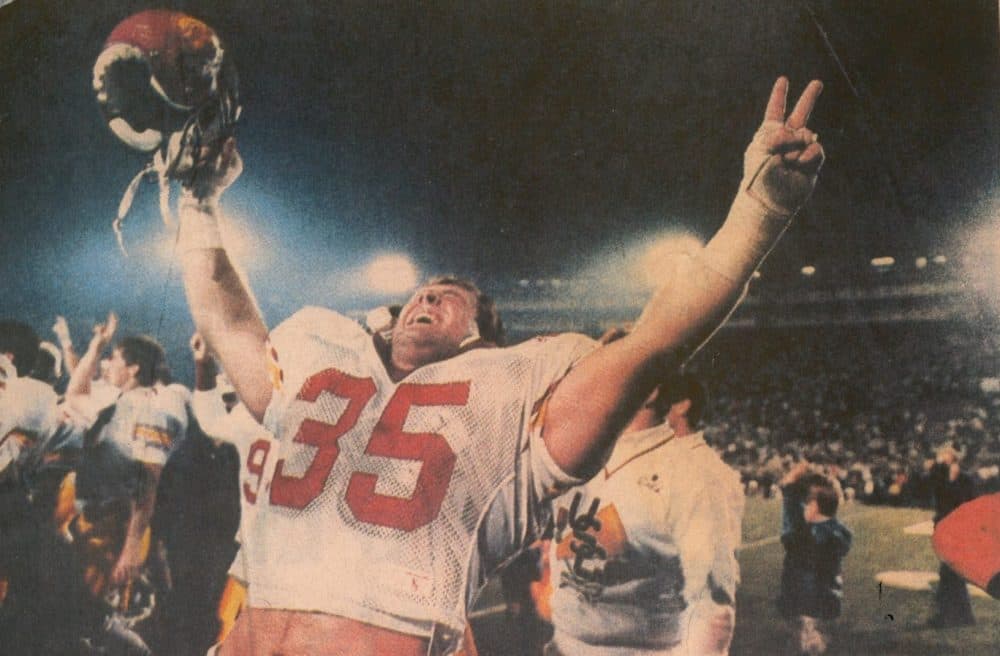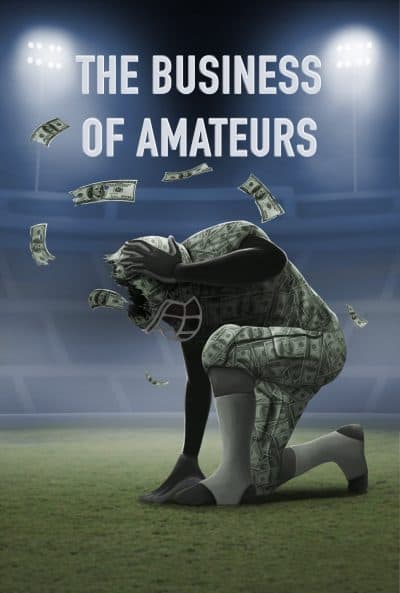Advertisement
After Friend's Death, Former USC Lineman Tackles Football's Risks In Documentary
Resume
"I love my school," Bob DeMars says. "I got to start under the great Pete Carroll. I think college sports is an amazing thing. It gives you a strong work ethic."
DeMars played football at USC from 1997 to 2001. He started only two games. Still, he took a lot of hits. Repairs were costly.
"I started kinda of adding up my body parts," he says. "My knees, my back, my shoulder – these are just some of the things that are inherent to a violent sport – and I started wondering, if we added all that up, would that outweigh the benefits of my free education?"
DeMars studied business administration at USC. After graduation, he became a filmmaker. And he started thinking about producing a documentary about those body parts, and how they weren’t working as well as they once had, and how he was on the hook for rebuilding them. He might have continued along that line if he hadn’t suddenly found himself with a house guest and a more pressing issue to confront.
Growing Concerns
"Everything changed when a guy named Scott Ross came to live with me," he says. "My roommate asked if his buddy could crash on the couch for a while. That was supposed to be a week. And seven months later it was, like, ‘OK, Scott. What’s the plan here?’"
After graduation, Scott Ross had found himself a good job. He began building a career. He was married. He had a family. But by the time he showed up on Bob DeMars’s couch, that was all gone.

"Scott Ross was the linebacker next to Junior Seau when he played at USC," DeMars says. "So he was a legend. I’d seen him on the walls. He was an All-American, he was in all the defensive meeting rooms, like, pictures of him everywhere. And when I met him, he was a shell of those pictures that you see on the wall. He wasn’t anything like that. You know, he was 39 years old, he’d just lost his job and he was diagnosed with dementia at the age of 39."
DeMars began thinking about including Scott Ross in his documentary. Unlike DeMars, Ross had been a college star. Like DeMars, he’d suffered his share of injuries, some of them more obvious than others. At the time, DeMars still felt his film would be about the knee, shoulder, and back issues – the stuff surgeons and physical therapists address. Then, in the middle of a working day, suddenly he had something else to worry about.
"I was in a meeting at Jeremy Renner’s company, not far from where I’m sitting now. He wasn’t actually in the meeting – we were meeting with his people. And they were pitching us things, and we were pitching them things. And it was a typical pitch meeting," DeMars says. "And all the sudden, I felt the back of my head get warm, and the room got really long. I was in this flannel shirt and it just got really hot. It literally felt like someone slipped me some type of drug, because it was such a physical sensation. I wanted to run out the room, but the part of me that was still there goes, ‘Wait a minute. That’s crazy. You can’t just run out of the room in the middle of a meeting.’ So I just sat there and I rode it out, and luckily the two people that were talking in the meeting didn’t ever notice because they were busy chatting it up."
DeMars would learn that he’d had a panic attack. Neither DeMars nor his doctors initially associated the attack with the concussions DeMars had suffered playing football. Eventually, they would make that connection. Still, DeMars wasn’t sure he wanted to talk about it.
"But the reality is," DeMars says, "I can’t ask Scott Ross to give me his warts and all and then me not to do the same."
Back For One Day
It took a while to gather the money to make the documentary. DeMars had to find the right doctors and experts, and he had to convince them to participate. As he was doing so, Scott Ross’s condition was deteriorating.
"It’s difficult for people to reconcile the person that they knew with the person that they’ve become.”
"I think that it was the hardest part in making this film," DeMars says. "I was somebody that Scott could call on when he needed help. And you get him on the phone, he’d be rambling and his thoughts would be really misplaced, and I’d get calls at two in the morning where he would be in a really dark place, and he’d say, ‘You know, if the handle on this bottle was a trigger, I’d pull it.’
"My wife would be getting up at 5:30 to leave for work, and I’d still be on the phone. But the day that we interviewed him, it was interesting, because, well, first, he was four hours late for the interview. I flew this crew out there, we’re waiting in front of an IHOP for four hours, and finally he shows up. But for some reason that day when we interviewed him, it was almost like the powers that be, God, whatever you want to call it, gave him his brain back for one day. And he was just lucid and he was speaking in sound bites. And for five hours he was just on it."
"In your whole career, how many concussions do you think you received?" DeMars asks Ross in the documentary.
"I know — the ones that I can remember? Twelve," Ross answers. "And I can’t tell you how many times I blacked out on the field and shook my head and did one of those and tried to get my senses and walked back right to the huddle, and the whole next play, just sorta hoping they didn’t run my way."
"He was on all sorts of pills," DeMars says. "I mean, he had a whole, giant, almost like suitcase-sized pillbox for all of the conditions that came with all the violent concussions he had over the years."
"And there’s been a couple times," Ross says in the documentary, "when I didn’t have access to my anxiety pills, and the only thing out there was a can of Budweiser."
"He would go into violent outbursts when he was drinking," DeMars says. "That wasn’t something that he had a problem with early in his life. You know, there were some things that he didn’t want to talk about, too. It’s difficult for people to reconcile the person that they knew with the person that they’ve become. And Scott was loved by everybody, but after a while, you’d have Scott around for a while and you’d be worried about your family or that he’d have an outburst or something bad might happen. Or he might drink and go off the rails and you’d have to contain him."
At some points during the documentary, "The Business of Amateurs," Ross seems to be just talking with a friend, rather than speaking to the camera.
"Hopefully, when you get to be in your 40s and 50s, you’re OK, and you still have enough people around you to take care of you. Because the end will come," he tells Bob DeMars. "You can’t be a gladiator your whole life."
'I Knew What It was'
The interview went on for five hours. Scott Ross was able to keep it together throughout that time. And then, it was over.
"As soon as we dropped him off at the Motel 6, you know, he was completely wiped out," DeMars says. "I mean, he could barely walk. Somebody with a brain injury like Scott, five hours is a lot. He gets wiped out. That’s a big part of why he can’t work anymore. You know, there’s no system of support set up for any of these guys from college that deal with anything related to disability. In fact it’s still an NCAA violation for a school to help with an athlete with disability."
"How did you learn of his death?" I ask.
DeMars sighs.
"His ex-girlfriend Laura was calling me. .... I just instantly knew that Scott was dead. And I think one of the, I guess, things that makes me feel guilty about this film is that I let it go through to voicemail because I knew that I had to record it for the film.”
"His girlfriend called me — it was at 10:30 at night – his ex-girlfriend Laura was calling me," DeMars says. "I knew what it was. I just instantly knew that Scott was dead. And I think one of the, I guess, things that makes me feel guilty about this film is I let it go to voicemail because I knew that I had to record it for the film. It’s something difficult to reconcile with, but I miss my friend all the time."
Scott Ross died in September of 2014, while DeMars was in the middle of editing his film.
"I had been having talks with USC at the time, and one of the administrators had said, ‘What does Scott need? How can we help him?’ I know that USC would have stepped up and helped him if that wasn’t a violation," DeMars says. "I definitely had some anger there because his body was found in a church and had been sitting there decomposing for a week before somebody found him. I feel like a legend like Scott deserves more respect than that."
'The Business Of Amateurs'
Bob DeMars hopes that including Scott Ross’s story in "The Business of Amateurs" will alert athletes, their parents, and football fans not only to the risks players face, but to the responsibility DeMars feels the colleges, universities, and the NCAA should be assuming for the welfare of those players.

"I learned a lot about college athlete rights," he says. "It’s almost like I got my masters in it, spending the three years making this film. When it comes to the things that aren’t arguable, I think putting players' health first — you know, you can talk about salaries all you want. I think that’s the last step, if it’s a necessary step at all. You know, there’s a billion dollars in new revenue in the sport every year. We could cover all of our athletes for their injuries."
Even after the film was finished, DeMars didn’t stop learning.
"We’ve had screenings of my film, and I’ve had about half-a-dozen of my teammates from USC came up to me after the screening and they whispered in my ear, ‘I have what you have,’" he says. "I know that there's guys that are out there suffering."
Football players at all levels know more about head injuries than they did a decade ago. Even the NFL has acknowledged connections between head injuries and conditions such as chronic traumatic encephalopathy, Parkinson’s Disease, memory loss, mood swings, and depression. And the documentary doesn’t neglect all the other ways in which football can beat up those who play it. In "The Business of Amateurs," Bob DeMars points that the college game has lagged behind the NFL in terms of diagnosing, treating, and taking responsibility for all sorts of injuries. He’s trying to bring to a larger audience the problems numbers of former college players face. It hasn’t been easy or pain free.
"There’s a certain amount of guilt that comes in knowing that Scott’s story and losing Scott elevates the film, to a certain degree. But at the end of the day, Scott’s story being shown in this film is really the silver lining, that his story may change the system, it may save lives. And it definitely put a bigger burden to get it right and to make sure that this film becomes Scott’s legacy and his story lives on.
"The Business of Amateurs" is available now through iTunes, Amazon and other pay-per-view and video on demand services.
This segment aired on September 17, 2016.

